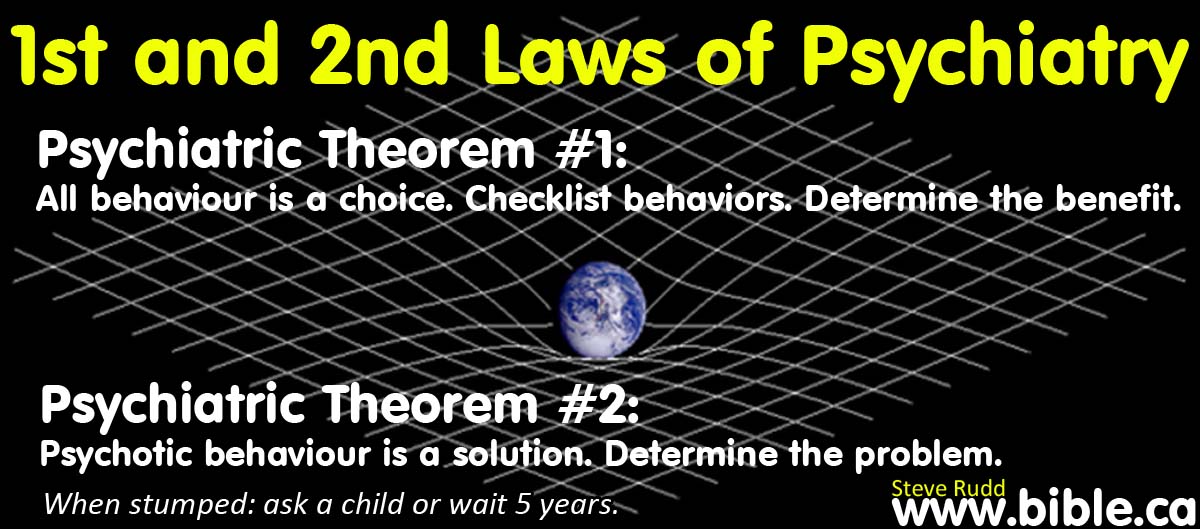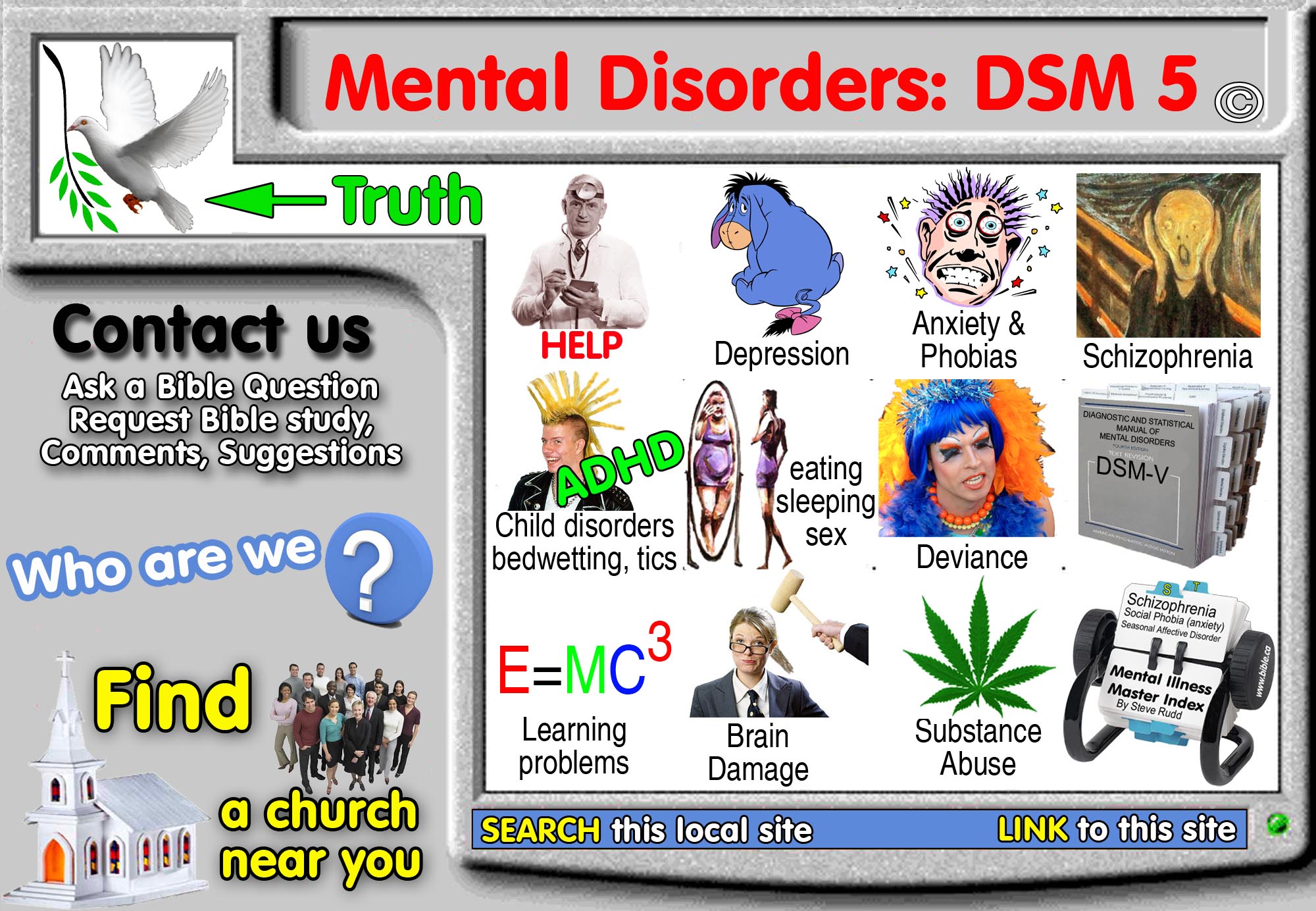The case of "Soup" (Schizophrenia, secret sin)
Casebook of Biblical Psychiatry © Version 7 (CBP-7)
|
Based upon |
Casebook of Biblical Psychiatry© brings the principles of Biblical Psychiatry to life based upon real-world cases and familiarizes Christians with different types of situations. This practical companion volume to Biblical Psychiatry© includes not only diagnosis, but also in-depth discussions by experienced Christians for Biblical approaches to treatment. This meticulously detailed volume of dynamic real-life case studies is simply a "must read" for all clinical Psychiatrists, mental health care professionals and Christians interested in expert opinion on today's treatment approaches. Psychiatric students, educators, and practitioners—as well as social workers, nurses, medical physicians, and interested laypersons—will find this unique volume of inestimable value in their day-to-day work.
|
|
|
|
|
The case of (Schizophrenia, secret sin) |
|
|
|
||||||
|
|
The case of "Soup" |
|||||
|
|
Biopsychiatric labels DSM-5 |
Schizophrenia, depression |
||||
|
|
Checklist Behaviours DSM-7 |
Some unknown secret moral sin, Deception, lying |
||||
|
|
Insights MMPI-7 |
|
||||
|
|
Quick Pick EDS-7.1 |
Insanity |
||||
|
|
Self-disablement EDS-7.2 |
Committed to an asylum |
||||
|
|
Chemical imbalance EDS-7.3 |
No. Never ingested opium. Although before the era of prescribed psychiatric drugs (1950's) which create chemical imbalances in the brain, at this point in history Opium was the only drug widely used to create chemical imbalances in the brains of the insane. |
||||
|
|
Benefits EDS-7.4 |
Smokescreen for secret sin that is soon to be discovered: EDS-7.4.10 Avoid deserved rebuke, criticism, shame: EDS-7.4.11 Self-punishment for personal failures or to ease a guilty conscience: EDS-7.4.12 Victimhood: EDS-7.4.13 |
||||
|
|
Monetary EDS-7.5 |
- |
||||
|
|
Annoyance Scale EDS-7.6 |
High |
||||
|
|
Diagnostic Laws EDS-7.7 |
Law of Narcissistic Behaviour Choice (NBC) EDS-7.7.1.NBC Law of Derivative Personal Benefit (DPB) EDS-7.7.2.DPB Law of Domino Problem Transference (DPT) EDS-7.7.4.DPT Law of Annoyance Toleration Threshold (ATT) EDS-7.7.5.ATT Law of Habitual Smokescreen Decoy (HSD) EDS-7.7.10.HSD Law of Locus Pentaphasic Transmutation (LPT) EDS-7.7.11.LPT Law of Pediatric Multifarious Obfuscation (PMO) EDS-7.7.12.PMO Law of Anticipatory Warthog Psychosis (AWP) EDS-7.7.13.AWP |
||||
|
|
Determine the Problem |
Secret sin of adultery soon to be discovered |
||||
|
|
Ask a Child |
I get real scared of a spanking when I do something wrong too. EDS-7.7.12.PMO |
||||
|
|
5 years later EDS-7.7.LPT |
He repented or felt he had punished himself enough and returned to normal life. |
||||
|
|
|
|||||
Philippe Pinel 1805 AD: A catholic becomes schizophrenic in response to the persecution of the Catholic Church in France and goes on a hunger strike and cured with the threat of torture if he doesn't eat.
A young religious enthusiast, who was exceedingly affected by the abolition of the catholic religion in France, [the French Revolution, 1789 AD], became insane. After the usual treatment at the Hotel Dieu, he was transferred to the Asylum de Bicetre. His misanthropy [hatred] was not to be equalled. His thoughts dwelled perpetually upon the torments of the other world; from which he founded his only chance of escaping, upon a conscientious adoption of the abstinences and mortifications of the ancient anchorites [monks living in isolation etc]. At length, he refused nourishment altogether; and, on the fourth day after that unfortunate resolution was formed, a state of langour succeeded, which excited considerable apprehensions for his life. Kind remonstrances and pressing invitations proved equally ineffectual. He repelled, with rudeness, the services of the attendants, rejected, with the utmost pertinacity, some soup that was placed before him, and demolished his bed (which was of straw) in order that he might lie upon the boards. How was such a perverse train of ideas to be stemmed or counteracted? The excitement of terror presented itself as the only resourse. For this purpose, Citizen Pussin appeared one night at the door of his chamber, and, with fire darting from his eyes, and thunder in his voice, commanded a group of domestics, who were armed with strong and loudly clanking chains, to do their duty. But the ceremony was artfully suspended;—the soup was placed before the maniac, and strict orders were left him to eat it in the course of the night, on pains of the severest punishment. He was left to his own, reflections. The night was spent (as he afterwards informed me) in a state of the most distressing hesitation, whether to incur the present punishment, or the distant but, still more dreadful torments of the world to come, After an internal struggle of many hours, the idea of the present evil gained the ascendancy, and he determined to take the soup. From that time, he submitted, without difficulty, to a restorative system of regimen. His sleep and strength gradually returned; his reason recovered its empire; and, after the manner above related, he escaped certain death. It was during his convalescence, that he mentioned to me the perplexities and agitations which be endured during the night of the experiment. In the preceding cases of insanity, we trace the happy effects of intimidation, without severity; of oppression, without violence; and of triumph, without outrage. How different from the system of treatment, which is yet adopted in too many hospitals, where the domestics and keepers are permitted to use any violence that the most wanton caprice, or the most sanguinary cruelty may dictate. In the writings of the ancients, and especially of Celsus, a sort of intermediate and conditional mode of treatment is recommended, founded, in the first instance, upon a system of lenity and forbearance; and when that method failed, upon corporal and physical punishments, such as confinement, chains, flogging, spare diet, &c. (p) Public and private mad-houses, in more modern times [ie. 1806 AD], have been conducted on similar principles. (A Treatise on Insanity, Philippe Pinel, 1806 AD)
Discussion:
In 1806 AD, Philippe Pinel, doctor for the Bicetre Asylum in France, gets our gold star of achievement of all the major mad house doctors. He used "moral therapy" that merely threatened torture. Unlike all the other mad houses, Pinel refused to torture and use vomits, blistering and bloodletting of the day. Pinel correctly understanding that insanity was a spiritual problem, not an organic/physical problem with the brain. Instead of drugs, he cured insanity by "moral treatments". "My faith in pharmaceutic preparations was gradually lessened, and my scepticism went at length so far, as to induce me never to have recourse to them, until moral remedies had completely failed" Philippe Pinel would rise up today and oppose the chemical psychiatrists who believe insanity is a chemical imbalance of the brain, that insanity is incurable. He would object to labeling the insane as biological misfits for life because it unnecessarily robs the soul of all hope. Of course, the only reason Pinel's threats of torture worked were because his patients believed the threats. If they knew it was a hollow threat, they would not comply. This further underscores the fact that all behaviour is modified by freewill choice of the insane, not treatments, drugs, shocks or torture.
Here is a man who felt guilty and worthy of damnation for some unrepented sin he had committed, who chose to become psychotic and punishes himself through a hunger strike and harsh treatment of his body by sleeping on wood rather than the straw mattress. At a time in history when torture was routinely used to motivate schizophrenics back to normal life, Pinel took the kinder, gentler approach of the threat of torture as a first option. He staged an act outside the insane man's cell where the staff rattled chains and threatened violence to the man. Pinel, however, intervenes with a bowl of soup and the threat that if the man doesn't eat the food by morning, he will suffer torture. Pinel "cured" the man because after this, the man submitted his will and restored his weak and over tired body and mind to normal health. Pinel realized that the man's schizophrenia was a solution to his fear of eternal torture in hell. Pinel wisely knew that if the man's behaviour could be modified by the threat of eternal torture, that he could also be motivate by a threat of torture in the morning if he did not eat his soup. The truth is that a sick, tired and mal-nourished body will contribute to irrational thinking in the same way sleep deprivation does. Today, Pinel's method would clear out half the mental patients in the lock down ward… except the asylum inmates know there is no real threat of torture. If they were tortured, or even deprived of a single privilege, they would sue. However his moral treatment worked only if the patient believed the threat was real. If they did not believe the threat, they would never have chosen to modify their own behaviour. This underscores that schizophrenia is a moral choice, not a disease.
If Pinel had access to the "Clinical Textbook of Biblical Psychiatry", he would have immediately recognized that the reason for the insanity was absurd and to be rejected. Pinel should have said, "It is ridiculous for you to tell me that you are driven insane just because the Catholic church is banished from France. Christians view this as persecution, not a reason to become disabled and psychotic. So obviously there is some other reason for this behaviour choice, like some secret sin you have committed. So come clean and stop wasting everyone's time and money, and tell me what sin has driven you mad?" After acting insulted, getting angry, being indigent and a few lying decoy answers, he would have finally confessed.
The key is that Christians don't fear hell when others persecute them. When a Christian is persecuted they do not get depressed, they rejoice! The only reason a Christian will be driven mad in fear of hell, is because they know they have sinned and are headed to hell. Sinners who need rebuke, instead, act the "sick part" and garner sympathy.
Benefits from behaviour: This illustrates the Law of Narcissistic Behaviour Choice (NBC) EDS-7.7.1.NBC
- Smokescreen for secret sin that is soon to be discovered: EDS-7.4.10.Completely absent from Pinel's account from 1805 AD, is the obvious fact that the man was fabricating his insanity to hide a secret sin, likely sexual in nature.
- Avoid deserved rebuke, criticism, shame: EDS-7.4.11. Going mad because your faith is under attack is rather noble and praiseworthy. "Look how much it bothers him because his church was kicked out of France! I wish my faith made me care that much!"
3. Self-punishment for personal failures or to ease a guilty conscience: EDS-7.4.12. His moral failure bothered him and his hunger strike and ascetic life in the asylum was a way of saying, "See God! I am punishing myself for my sin!" After he felt he had punished himself enough in the asylum, he returned to normal life.
4. Victimhood: EDS-7.4.13. In a classic case of victimhood, the sinful man who knew he was destined for hell, made himself out to be a victim of the French King's edict attaching his faith.
Diagnostic laws that are seen illustrated in the case of "soup":
- The man calculated that the cost of being labeled insane was worth the benefit of avoiding his sin. This illustrates the Law of Derivative Personal Benefit (DPB) EDS-7.7.2.DPB
- Imagine the trouble this sinner caused everyone. This illustrates the Law of Domino Problem Transference (DPT) EDS-7.7.4.DPT
- His behaviour became so annoying that his relatives finally found relief by sending him to the asylum. This illustrates the Law of Annoyance Toleration Threshold (ATT) EDS-7.7.5.ATT
- His schizophrenia was a decoy to his unrepented sin. This illustrates the Law of Habitual Smokescreen Decoy (HSD) EDS-7.7.10.HSD
- At the beginning of 5 years he was in an asylum. At the end, he was out, showing that he really didn't want to be there. This illustrates the Law of Locus Pentaphasic Transmutation (LPT) EDS-7.7.11.LPT
- While atheists may think persecution will drive a Christian insane for fear of hell, to the faithful, this is utterly ridiculous and must be rejected. It simply doesn't pass the sniff test. A child would say, "I get all scared of my dad coming home if I disobey mommy. I wonder what he did that he is all worried his is going to get a spanking when daddy gets home?" This illustrates the Law of Pediatric Multifarious Obfuscation (PMO) EDS-7.7.12.PMO
7. His psychotic behaviour, self-denial and hunger strike are all what you would predict of a man who, like the warthog, knows he is headed for a huge shock on judgement day. This illustrates the Law of Anticipatory Warthog Psychosis (AWP) EDS-7.7.13.AWP
By Steve Rudd: Contact the author for comments, input or corrections.
Send us your story about your experience with modern Psychiatry


